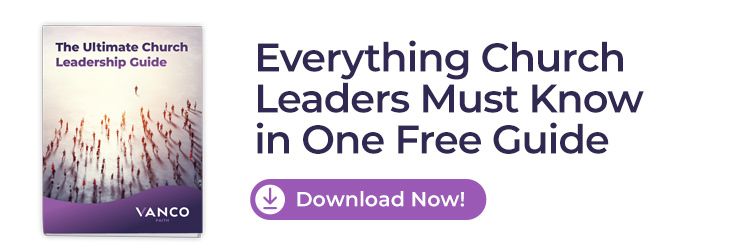
Disagreements are never straightforward, but if we always pretend that everything's okay, our relationships will suffer. When it comes to the church, conflict can threaten unity. The first step to healing is prioritizing church conflict resolution in a way that honors God. Conflict within your congregation will create toxicity and eventually lead to a hostile environment if left unhandled. Unmediated conflict can also be among the most significant hindrances for church growth.
The good news is that dealing with conflict doesn't have to be complicated. There are ways to work through it that everyone can be happy with. But how? Keep reading to learn how to resolve conflict in the church with these ten helpful tips on church conflict resolutions.
Table of Contents
- What Is Conflict Management in Church?
- Why is There Conflict in the Church?
- Can You Let Conflicts Resolve Themselves?
- Four Types of Conflicts
- Training and Development for Conflict Resolution
- Building a Culture of Open Communication
- FAQs
- Get Everything Church Leaders Must Know in One Free Guide
What Is Conflict Management in Church?
Without conflict management, it would be hard to retain church members. All leaders must have a conflict management strategy.
Remember that a church is just a group of people with a common interest in their faith. Like in all other groups of people, conflict will inevitably arise from time to time. The specific source of conflict can vary, but the effects always deserve a serious response.
These conflicts can happen between churchgoers, staff members, or even yourself and someone else. You need to know how to manage these conflicts without causing more problems if you want the church to be a peaceful and safe place for everyone who chooses to spend time there.
A conflict-ridden church is sure to lose members. While you may lose members who are unable to be nice to others, you don't want to lose members who are victims of other people's behavior.
Conflict management means that you're going to step in to prevent and diffuse any conflicts, even if they include yourself.
Why is There Conflict in the Church?
Now that we’ve answered the question of what is conflict management in the church, it’s time to look into why conflicts start in the first place. There are plenty of reasons that conflicts can pop up. Again, a church is just a group of people. Just like disputes can arise at work, home, or school, they can arise at church.
Some conflicts between congregation members can happen due to a bossy church member, someone acting up, or even outside conflict (like relationship problems or family issues) that find their way into the church. Remember, you never know what issues people are dealing with when they're not at church, and they can bring those issues to events and services (even unintentionally).
When it comes to your staff, conflict can result from power struggles. Even though this isn't a traditional work environment, it's normal for people to feel dis-empowered or even eager for more control.
Sometimes conflicts arise simply because personalities clash. There's nothing wrong with this per se, but it still needs to be handled if you want to maintain a peaceful environment. Conflict is natural, but a refusal to deal with it can be one of the signs of a dying church.
Can You Let Conflicts Resolve Themselves?
 There are situations where it can be more prudent to stay on the sidelines and observe a conflict instead of stepping in right away. It's common for disputes to resolve themselves if they're minor, and it's a good idea to allow people to gain their church conflict resolution skills when it's appropriate for them to do so.
There are situations where it can be more prudent to stay on the sidelines and observe a conflict instead of stepping in right away. It's common for disputes to resolve themselves if they're minor, and it's a good idea to allow people to gain their church conflict resolution skills when it's appropriate for them to do so.
With this in mind, if a conflict is significant or if it's lasted for a long time, it's a good idea to step in (or seek outside help if you are part of the conflict). This is a situation in which you need to use your best judgment.
1. Set a Good Example by Modeling Christ
If you’re looking to understand how to resolve church conflict, the first thing you should do is look to Christ as an example. Remember that it's your responsibility to model Christ as a church leader. This should be something that you aim to do, even when you're not trying to resolve church conflict.
Being Christ-like is all about modeling kindness and compassion for others. It's about being a role model and setting an excellent example for the members and staff of your church to follow.
When you model Christ, you'll also avoid conflict between yourself and others. Even when problems arise, you'll have the self-control and understanding to move beyond them and express yourself in healthy ways.
You should also encourage your church to model Christ. After all, if they're not modeling Christ, how are they expressing and following their faith?
2. Include Church Conflict Resolution Content in Your Sermons
To educate your staff and congregation on modeling Christ, find ways to incorporate conflict resolution into your sermons whenever you start to detect problems.
What does the bible say about the consequences of anger and poor conflict resolution? What are the benefits of showing compassion instead?
When you include conflict resolution in your sermons, you indirectly address the entire group. This helps you avoid further conflicts, and staff or congregation members won't feel as though you're calling them out.
When people recognize how their behavior may not align with their faith, they may start to resolve conflicts independently. This can yield positive results as you deal with both personal conflicts and leadership conflicts within your church body.
3. Talk to Your Congregation as a Group (Directly)
If there's significant conflict within your church, you may have to address it more directly. While you should still try to set a good example and include it in your sermons, a heavier hand is sometimes needed.
Address the group kindly and mention, in a broad way, things that you've been noticing. Instead of leading with negativity, lead with positivity. For example, instead of saying that you're disappointed in lousy behavior, talk about how you're looking for ways to encourage better behavior and cooperation.
Again, by addressing the congregation and staff as a group, you'll avoid calling out anyone specific. This will be a common theme whenever we're discussing handling church problems. You never want to make someone feel inferior in front of the group or embarrass anyone inadvertently.
You can also do this in your church newsletter if you'd instead not address the problem aloud.
4. Learn Active Listening Skills
Do you and your staff already have excellent active listening skills? If not, you might find church conflict resolution challenging. When you display active listening, you show the other person that you care about them and their situation. You display compassion.
But what does active listening look like?
Make sure that you're acknowledging everything that the other person says. You don't have to give verbal responses, but even nodding your head and using filler words like "okay" and "really?" can be helpful.
When it's appropriate to do so, add your opinion.
Ensure that you're paying attention to the other person's body language. Sometimes the body will say more than the mouth can. You can easily spot discomfort or tension if you're attentive.
Do your best to avoid passing judgment, especially before the other person is done speaking. Let someone finish their story before trying to determine a solution.
Active listening will help you prevent and solve conflicts, so it's a crucial form of emotional intelligence.
5. Don't Add Too Many Outside Parties
This can be tricky. When you're dealing with common church conflicts, it's in your best interest to involve as few outside parties as possible (though it's a good idea to apply at least one extra person, usually yourself, in most cases).
When there's conflict within a group, tensions are already high. Several people with varying opinions and problems need to be resolved. When you add more people, you add more conflicting views (even if the people are well-intentioned).
Adding one neutral third party is a great idea, and often you'll be that neutral third party when you're talking to church staff or congregation members. You're creating an environment where everyone can say their piece to someone listening without any bias.
If you add multiple people, you're adding numerous opportunities for things to go wrong.
Bonus tip: make sure that you brief people on conflict resolution strategies before adding them to a conflict situation. If you're unable to mediate a conflict, another staff member can do it, but you need to know that they're emotionally capable of doing so.
6. Provide (or go to) One-On-One Mediation
One-on-one mediation is often the best solution for conflicts within the church (or group mediation if the conflict is between more than two people). This allows you to hear everyone out and address their concerns individually while maintaining their privacy.
Most of the time, you'll be the best choice of mediator. Your congregation and staff members trust you, and they're more likely to listen to you or take your lead than any other member of the church.
If you have another person who's a delegated mediator, make sure they're up for the job. It's a good idea in your church conflict resolution to bring in a dedicated counselor for this purpose if you feel out of your depth.
If you're the person who's having conflict with a staff member or someone in the congregation, you should still go to mediation. This is another situation where it's a good idea to have someone at the church with plenty of experience with conflict resolution.
You may not have the ability to take a step back from your conflicts and view them with an unbiased eye. Have the humility to allow someone else to help you. Indeed, humility is one of the key peacemaking principles.
7. Set Actionable Goals
While you're mediating a conflict, make sure that you help the people in question set actionable goals for moving forward. These goals will vary depending on the conflict at hand.
So what should these goals look like?
Help the people in conflict determine what would make them feel better about the situation. What's the solution to the conflict?
This means that they simply won't speak to each other again for some people. While this isn't an ideal outcome, it's far better for people to reduce their contact than it is for them to be arguing.
For others, giving a specific timeframe of space is a great idea. This is a clear boundary that both parties can follow and reassess later on when they've had time to cool down.
For example, some people may need three months of space to get through a stressful time in their life before they're able to address the conflict again. When that time is passed, they may feel ready to reconnect.
If reconnection is the goal, what does that reconnection look like? Some people may want to have weekly mediation sessions until they're in a good place again. Others may wish to reconnect over activities or outings even if interactions are tense at first.
Help them set these goals and stick to them.
8. Start and End Conversations on a Good Note
If you’re looking to understand how to resolve church conflict, it’s important to end on a good note. No matter what you're discussing, conflict or otherwise, you should always do your best to end with a positive tone. Use the model of the "compliment sandwich" here (even though the context is different).
When you face a problem, you have to start it with an understanding that both parties will get to say their peace. You could, in theory, have them both start by saying something positive about the other person or the relationship as a whole.
This will get everything on the right track.
The middle of the conversation is going to be tricky. This is when people will discuss their problems with each other, and it's normal for emotions to run high.
Once both parties have had the opportunity to speak and you've done your best to meditate as a part of your church conflict resolution, be sure to end with more positivity. Have them say something kind or, if that's not possible, say something kind about them yourself.
9. Set Clear Intentions and Expectations
If you're trying to figure out how to deal with church conflict, sometimes it's best to set clear expectations instead of talking to people individually about their problems. This is helpful regardless of whether the conflict is amongst the church staff or the other churchgoers.
Talk to them about the kind of behavior that you expect to see. Don't threaten consequences. Instead, set boundaries.
This is more useful for conflict prevention. When people know what they're "supposed" to do ahead of time, they're less likely to get into conflict in the first place.
10. Introduce Fun Bonding Activities
Conflict resolution can happen outside of the mediation room, which is sometimes beneficial. While mediation is a valuable tool, try incorporating fun activities to control conflict further.
People often forget that they can have fun or bond with the other person they're in conflict with. When you arrange fun activities in which they're forced to collaborate, they might be surprised at how well they get along.
This will not work for everyone, and some conflicts are too deep (such as conflicts between former partners). That said, it's a great resource to add to your conflict resolution toolbox, facilitating not only church growth but potentially spiritual growth, too.
Four Types of Conflicts
It's important to recognize that conflicts happen in every church community, yet not all conflicts are created equal. Assessing different types of conflicts is an important step toward mediating these tension points wisely, pastorally, and effectively.
1. Doctrinal Conflict
Doctrinal conflicts are those that involve varying or contradicting interpretations of the Bible, the church's confessional statements, or the church's theological tradition. These conflicts can arise due to cultural and generational differences, or from an influx of congregants who hail from different theological backgrounds.
These conflicts can be difficult to mediate, as they tend to involve deeply and intensely-held beliefs. What's more, many theological traditional prioritize certainty, making it challenging for congregants to acknowledge varying perspectives.
An article from The Shepherd's Church provides some insight into managing this particular type of conflict in the church.
2. Leadership Conflicts
Another type of conflict to be aware of involves church leadership. Leadership conflicts can involve disputes between different leaders, or disputes between members and leaders.
Leadership conflicts can emerge from a number of factors, including:
- Differences in vision
- Personality clashes
- Lack of clarity regarding church polity
Because these conflicts can breed distrust toward church leadership, they can be especially damaging to the life and vitality of the congregation.
An article from Faith in the Divine highlights some opportunities to mediate tension that exists between pastors. Collaborative leadership structures can be especially impactful here, ensuring accountability for each member of the pastoral staff.
3. Resource Conflicts
A third type of congregational conflict is what's known as a resource conflict.
Resource conflicts tend to involve disputes about how best to allocate church resources, which can involve finances or facilities. Often, resource conflicts simply involve different goals or priorities for the church. For example, one member may wish to emphasize global missions, while another may prefer to invest more robustly in local ministries to the homeless.
Having a broader decision-making body, like a finance committee, can be helpful in mediating these issues.
4. Personal Conflicts
Finally, some conflicts involve simply clashes in personality. These conflicts often stem from misunderstandings, miscommunication, or hurt feelings.
When left unaddressed, personal conflicts can spill over and adversely affect the life of the entire congregation. These conflicts can often be resolved through mediation from a pastor or elder, or from some other kind of peacemaking ministry within the church.
A blog from Concerning Him shares some tips and best practices for mediating personal conflicts within an ecclesial setting.
Identifying Early Warning Signs of Conflict
One of the most critical components of dealing with conflict within a church is developing an awareness of "red flags" and warning signs.
There are a number of indicators that a church is primed for conflict, or that inflection points might soon arise. Examples include:
- The congregation and/or the leadership team lack a shared goals or collective vision.
- Tradition is valued to the point that change is anathema.
- Major decisions are constantly put off.
- There is a high level of leadership churn.
- Congregants feel content to criticize without offering to serve or to help.
- People are quick to leave meetings or services without taking any time for fellowship.
Observing any of these red flags is reason enough to take stock of your church's health and vitality, and to consider measures to promote greater health, unity, and clarity of purpose.
Training and Development for Conflict Resolution
To ensure your church leaders know how to handle conflict when it rears its ugly head, it's important to provide some training.
Peacemaker Ministries is one great example of a training program that is specifically designed to promote biblical principles within the context of instructional or congregational tumult. Investing in this or a similar training program should be strongly considered for anyone working in a position of church leadership, including lay leaders from within the congregation.
Building a Culture of Open Communication
In addition to formal training in conflict resolution, it can be highly beneficial to create a culture of open communication within your church body.
- Ensure that church leadership provides regular updates about church policies, finances, and other important benchmarks. A church newsletter can be one avenue for this.
- Regular town hall meetings can be ideal spots for churches to not only provide information to members, but also to provide an opportunity for members to raise questions or concerns.
- Make sure congregants know the appropriate forums for raising any issues or concerns they have about the behavior of leaders, discouraging open but direction less criticism from within the congregation.
- Consider membership vows or covenants that include a two-way street for dialogue, feedback, and accountability between church members and leadership.
FAQs
How can faith leaders promote peace within their congregation?
Faith leaders can promote peace by encouraging open dialogue, addressing conflicts with empathy, reinforcing shared values, and providing opportunities for community service. They can also lead by example, support reconciliation efforts, and create safe avenues for honest communication.
What are the benefits of conflict resolution in churches?
Conflict resolution fosters reconciliation, strengthens relationships, enhances trust, promotes unity, and creates a more harmonious environment. It allows members to address issues constructively and work together towards shared goals. This can lead to interpersonal and relational growth as well as broader growth of the church body.
How can sermons help in resolving church conflicts?
For churches devoted to expository preaching, simply meditating on what Jesus says about peacemaking, as well as principles from Proverbs, can remind congregants of their shared values.
Why is active listening important in church leadership?
Active leadership is critical for helping congregants know that their concerns are heard and understood, and that their voices are genuinely important to church leadership.
When should external mediators be involved in church conflicts?
External mediation may be necessary when church leaders feel like they lack the skills to deal with major conflicts, or when conflicts involve the leadership team itself. Denominational resources and third-party mediators can all be helpful.
What are the key elements of effective mediation in churches?
Some important aspects of mediating church conflicts include neutral facilitation, active listening, clear communication, empathy, respect, accountability structures, and a commitment to shared problem-solving.
How can clear communication prevent conflicts in churches?
Clear communication prevents church conflicts by ensuring that everyone understands expectations, decisions, and concerns. It reduces misunderstandings, clarifies roles, and fosters transparency, all while keeping members aligned to common values.
Get Everything Church Leaders Must Know in One Free Guide
Get the tested church leadership strategies and techniques used by top ministries to build healthy and growing congregations. Download our free eBook to learn…











